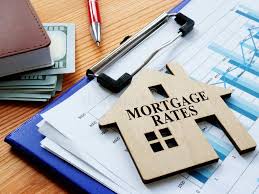Finding the right mortgage can be a daunting task, and understanding current mortgage rates is a crucial first step. This guide will equip you with the knowledge you need to navigate the mortgage landscape, from comprehending different rates to securing the best deal for your situation.
Understanding Mortgage Rates
- Interest Rate vs. APR: The interest rate is the basic cost of borrowing money, expressed as a percentage. The Annual Percentage Rate (APR) incorporates the interest rate and additional fees associated with the loan, giving you a more accurate picture of the total borrowing cost.
- Fixed vs. Adjustable Rates: Fixed-rate mortgages offer a constant interest rate throughout the loan term, providing stability in your monthly payments. Adjustable-rate mortgages (ARMs) have interest rates that fluctuate based on a benchmark index, leading to potentially lower initial rates but with the risk of increases in the future.
Current Mortgage Rate Trends (as of July 3, 2024)
- 30-year Fixed Rate: The average 30-year fixed-rate mortgage currently sits at 7.07%, with some lenders offering slightly lower or higher rates depending on your creditworthiness and loan details.
- 15-year Fixed Rate: If you prioritize faster payoff and potentially lower overall interest costs, a 15-year fixed-rate mortgage might be a good option. Current average rates hover around 6.83%.
- Adjustable-Rate Mortgages (ARMs): ARMs can be attractive due to their lower initial rates. However, with the current economic climate, some caution is advised. The average 5-year ARM rate is around 7.75%.
Factors Affecting Mortgage Rates
- The Federal Reserve: The Federal Reserve’s monetary policy significantly impacts mortgage rates. When the Fed raises interest rates, mortgage rates typically follow suit.
- The Economy: Economic factors like inflation and unemployment can influence mortgage rates. A strong economy might lead to higher rates, while a weaker economy could see rates decline.
- Loan Type and Credit Score: The type of mortgage you choose (fixed vs. ARM, loan term) and your credit score significantly affect the interest rate you’ll be offered. A higher credit score translates to a lower interest rate.
Shopping for a Mortgage
- Compare Rates from Multiple Lenders: Don’t settle for the first rate you’re offered. Obtain quotes from several lenders, including banks, credit unions, and online lenders, to find the most competitive rate.
- Consider Loan Fees: Beyond the interest rate, compare loan origination fees, application fees, and other closing costs associated with different lenders.
- Evaluate Your Needs: Consider your financial goals, risk tolerance, and preferred loan term when selecting a mortgage product.
Additional Considerations
- Down Payment: A larger down payment can reduce your loan amount, potentially qualifying you for a lower interest rate and improving your chances of loan approval.
- Private Mortgage Insurance (PMI): If your down payment is less than 20% of the home’s value, you’ll likely be required to pay PMI, which adds to your monthly payment.
- Locking in Your Rate: Once you’ve found a favorable rate, consider locking it in to protect yourself from potential future rate increases. However, locking typically comes with a fee.
Resources for Finding the Best Mortgage Rates
- Online Mortgage Lenders: Several online lenders offer streamlined mortgage applications and competitive rates.
- Mortgage Brokers: Brokers work with multiple lenders to find you the best possible rate based on your unique situation.
- Government Agencies: The Federal Housing Administration (FHA) and the Department of Veterans Affairs (VA) offer loan programs with more lenient qualification requirements and potentially lower rates.
Conclusion
Understanding mortgage rates and the factors affecting them empowers you to make informed decisions when securing a home loan. By shopping around, comparing quotes, and considering all the relevant factors, you can find the best mortgage rate that aligns with your financial goals and budget. Remember, this guide provides a general overview, and consulting with a qualified mortgage professional is recommended for personalized advice tailored to your specific circumstances.

